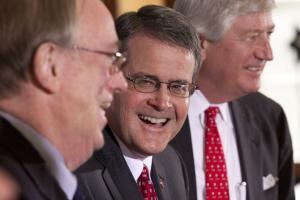Jere Morehead Goes Back to Basics In His First Year as UGA's Top Dog

Jere Morehead greets staff members July 1, 2013 on his first day as University of Georgia president.
When you ask about University of Georgia President Jere Morehead’s first year in office, you won’t find drama, dirt or underhanded backroom deals. You won’t hear sexy spin, political posturing or good-old-boy glad-handing. All aspects of his life seem centered around a singular idea—the advancement of UGA’s academics. It’s an unwavering 25-year focus that comes off as impressively determined but also mysteriously circumspect. Can someone really care this much about school?
Unlike his predecessor, Michael Adams, Morehead comes from an academic background, and he's made academics his focus over construction projects and political maneuvering. Morehead was all about education before being all about education was cool, making him an academic hipster of sorts—minus the sleeve tattoos and skinny jeans. In 1974, he finished high school at age 16 and enrolled at Georgia State University, where he earned a bachelor’s degree. Then he entered UGA’s Law School and graduated at age 23.
The six years he worked away from the university’s campus as an assistant U.S. attorney with the Department of Justice mark a small blip in his otherwise UGA-centric career. He shuffled up the leaderboard from there, serving as head of the UGA Law School’s Advocacy Program for nine years, then executive director of legal affairs for one year, associate provost and director of the Honors Program for five, vice provost for academic affairs for two, vice president for instruction for two, senior vice president for academic affairs and provost for three, and now president.

Jere Morehead is flanked by University System Chancellor Hank Huckaby and Board of Regents Chairman Dink NeSmith as they announce his appointment as UGA president.
XXIt’s been a slow and steady climb, one that would make sense at a corporation but is rare in academic circles. He’s the first alumnus of UGA to be named president since Fred Davison in 1967, and he’s the sixth president to be an internal hire from within the university, with the most recent being O.C. Aderhold in 1950. If there was any drama, it’s that he was named as the sole finalist for the presidency in January 2013, causing critics to wonder why the Board of Regents didn't put forward any other finalists, as is the custom with most UGA administration jobs. But even critics of the process found little fault with the end result.
“This is the right leader for our time,” says David Williams, who succeeded Morehead as Honors Program director and remains one of his close academic confidants. “He’s informed by an intimate working knowledge of the academic side of the house and yet also inspires us with a vision of where we can go from here.”
Taking Over
In his first year as president, Morehead has overseen the successful progress of projects set in motion before he took office—the first graduating class of the Georgia Regents University-UGA Medical Partnership, successful grants for Obesity Initiative research and budget approval for the Science Learning Center. He points to the new science facility, a 125,000-square-foot building that will house 33 teaching labs and two lecture halls, as one of the biggest accomplishments this year.
“I believe this project is going to transform the education of our students in a most significant way,” Morehead says. “That project is very important to the university and state, and I am appreciative of all the support that UGA has received in moving it forward this year.”
Morehead also faced plenty of top spots to fill, many announced as vacant before he took office. The list included the vice president for finance, vice president for external affairs, vice president for student affairs, executive director of legal affairs and six deans—business, journalism, international affairs, engineering, law and the graduate school, not to mention his own former job of provost. “Completing the hiring of a new team of senior administrators is very positive,” he says. “I think they’re all off and running in a good way.”
Since he started his new gig, Morehead has hired Pamela Whitten away from Michigan State to take over his old job; made interim Vice President for Finance and Administration Ryan Nesbitt permanent; named Bowdoin College's Kelly Kerner to take over for retiring Tom Landrum as chief fundraiser; brought back former UGA administrator Victor Wilson as VP for student affairs, replacing Rodney Bennett, who's now chancellor at Southern Miss; and appointed Michael Raebner from the high-powered Atlanta law firm King & Spalding as UGA's top lawyer.
Morehead's administration found a new business school dean, Benjamin Ayers, in-house; hired his new journalism dean, Charles Davis, from the University of Missouri's prestigious program; found SPIA dean Stefanie Lindquist at the University of Texas; and Donald Leo came from Virginia Tech to start up the engineering program. The law school and graduation school positions remain unfilled.
Academics First
It’s Morehead’s staunch focus on the university’s academic mission that has kept the ball rolling in a heavy transitional year, says Laura Jolly, vice president for instruction, who took over that role as Morehead stepped into the provost’s office.
“He sets a direction and is clear about where he’s going, which gives others that same clarity and direction,” she says. “He’s been incredibly clear that the students are the reason we’re here, and I’ve seen that from my interactions with him as he was vice president for instruction to provost to president.”
Jolly named four academic initiatives under her office that saw significant support in Morehead’s first year: the Odyssey class that all first-year students must take, the implementation of the new student information system, an emphasis on the university’s four-year college completion rate and the launch of a new Office of Online Learning. He’s an old-school academic, but he’s not old-fashioned—Morehead is interested in technology and how students will learn in the future, Jolly says.
“He values what we do in the classroom, and this is a new environment to do it in a measured and thoughtful way,” she says. “Several departments have approved new graduate programs that will begin online in the fall and next spring, and we’re focused on doing it well.”
Morehead also plans to support the Odyssey program this fall by jumping back into the classroom. Harkening back to his time in Terry College’s Legal Studies department, he will teach a one-hour seminar to freshman, “Exploring Current Issues in Law.”
“I think it’s not at all surprising that he has continued to want to stay connected with the students in that special way through the classroom,” says Rob Hoyt, Legal Studies department head who joined the faculty a few years after Morehead and went through the tenure process at the same time. “I can imagine how busy he is as president, but it would have surprised me more if he didn’t stay connected to the teaching and scholarship side.”
Morehead also taught Odyssey courses as provost in 2011 and 2012, taking a break in 2013 during his first year as president. Described as a “challenging professor” by Hoyt, Morehead consistently receives positive feedback on evaluations and has earned the university’s top teaching awards, namely the Josiah Meigs Award for Excellence in Teaching in 2001, the Lothar Tresp Outstanding Honors Program Professor in 1999 and the Richard B. Russell Undergraduate Teaching Award in 1995.
“He’s probably one of my least needy faculty members,” Hoyt says with a chuckle. “He’s been busy as president, but hasn’t forgotten his roots as a member of the Legal Studies faculty. We don’t see him much, but he does interact with his co-authors of the LEGL 2700 book and participate in some departmental social activities.”
Student Support
Morehead has made it a point to appear at numerous other events on campus in the past year, most notably a variety of student group meetings. On his first day in office, the president joined student leaders for breakfast at the Tate Student Center before tackling tasks in the Administration Building.
“He made an effort to be present at many different organization meetings, and what was interesting was his tone in those discussions,” says Austin Laufersweiler, who served as Student Government Association president for the 2013-2014 school year. “He came to one of our general body SGA meetings by himself and wanted to know what we were curious about. He asked for our questions and feedback.”
At that meeting, one student asked why Sanford Stadium’s lights were sometimes left on at night. Morehead wasn’t sure at the moment but said he would find out. Within 12 hours, he followed up with Laufersweiler and the student, naming several reasons provided by campus staff.
“There’s not a concern that’s too small,” Laufersweiler says. “It comes back to this idea of his approach being very authentic and genuine. Whenever SGA voiced a concern, and he said he cared about it and would do something about it, he was consistent with his actions.”
When SGA executives handled two hot topics in the fall—racist and homophobic comments on social media and football ticket allocation—Morehead was quick to jump into meetings with student leaders and listen. Hate speech appeared on Facebook in early November, and Morehead called Laufersweiler and student affairs administrators into his office within 48 hours to talk.
“He was looking for guidance and wanted a direct line to the students to address it,” Laufersweiler says. “We had an honest conversation about where the university is and where it could go in terms of diversity and inclusion. He wants to make sure students are involved in that conversation and shaping that direction for the future.”
In the football ticket debacle, graduate students were upset about changes made regarding allocation and class hours, particularly for the “Double Dawgs” who got their undergraduate degrees from UGA and came back for graduate school.
“I will say it was a little difficult to get to the bottom of what happened, but what was striking to me was how willing President Morehead was to listen and move forward,” Laufersweiler says. “It would have been easy for him to dismiss us, but his attitude tends to be, ‘Let’s talk about it and find a way to fix it.’”
It’s hard not to compare the obvious differences between Morehead’s calm and professorial demeanor and the outspoken leadership style of predecessor Adams, who boosted the university’s profile and fundraising status to a “Public Ivy” position in his 16 years as president (while embroiling himself in numerous controversies in the process).
“It’s hard to follow anybody who has led for that long, yet he has carved out a steady, workmanlike, productive first year,” Williams says. “His leadership style is reasonable, rational, transparent and decisive.”
Though he’s an academic, Morehead doesn’t like to hold endless committee meetings. He studies the situation, asks for advice and makes a decision. He moves with a disciplined calm, which helps him deal with large egos.
“He searches for best practices at other schools intentionally and decisively,” Williams says. “He looks at other models out there but is not afraid to go his own way and be decisive.”
Preferring to keep professional and personal aspects of his life separate, Morehead isn’t one to talk about hobbies or free time—if he has any. But others say he enjoys movies and books, usually dealing with politics, history and the Supreme Court. This week, in his one vacation week away from town, Morehead is spending time with extended family at St. Simons, an annual tradition that he prioritizes.
A Private Life
One personal aspect that Morehead doesn’t hide is his love for living in Athens. After 27 years in a two-story brick house in Five Points, he has embraced his new spot in the President’s House on Prince Avenue—unlike Adams, who resided in a ritzy Lake Oconee gated community for most of his tenure.
“I have to say, both areas of Athens are quite beautiful,” he said. “I really enjoy the neighborhoods that surround the President’s House and the easy access to downtown Athens from where I am on Prince.”
In the year ahead, Morehead plans to focus more energy on UGA’s $1 billion capital campaign, which will bolster all of his academic initiatives. “We can’t stand still. If you stand still, you’ll quickly fall behind,” he says. “We’re not going to spend any time celebrating success. Instead, we’ll keep working to advance the institution forward in the coming year.”
Above all else, Morehead wants more time, calling it his biggest challenge in Year One. “There are many issues confronting the university, and unfortunately, you have to pick and choose every day how you want to spend your limited amount of time,” he says. “I wish I had more time each day to meet with faculty, students and alumni. It’s been a challenge of balance.”












comments